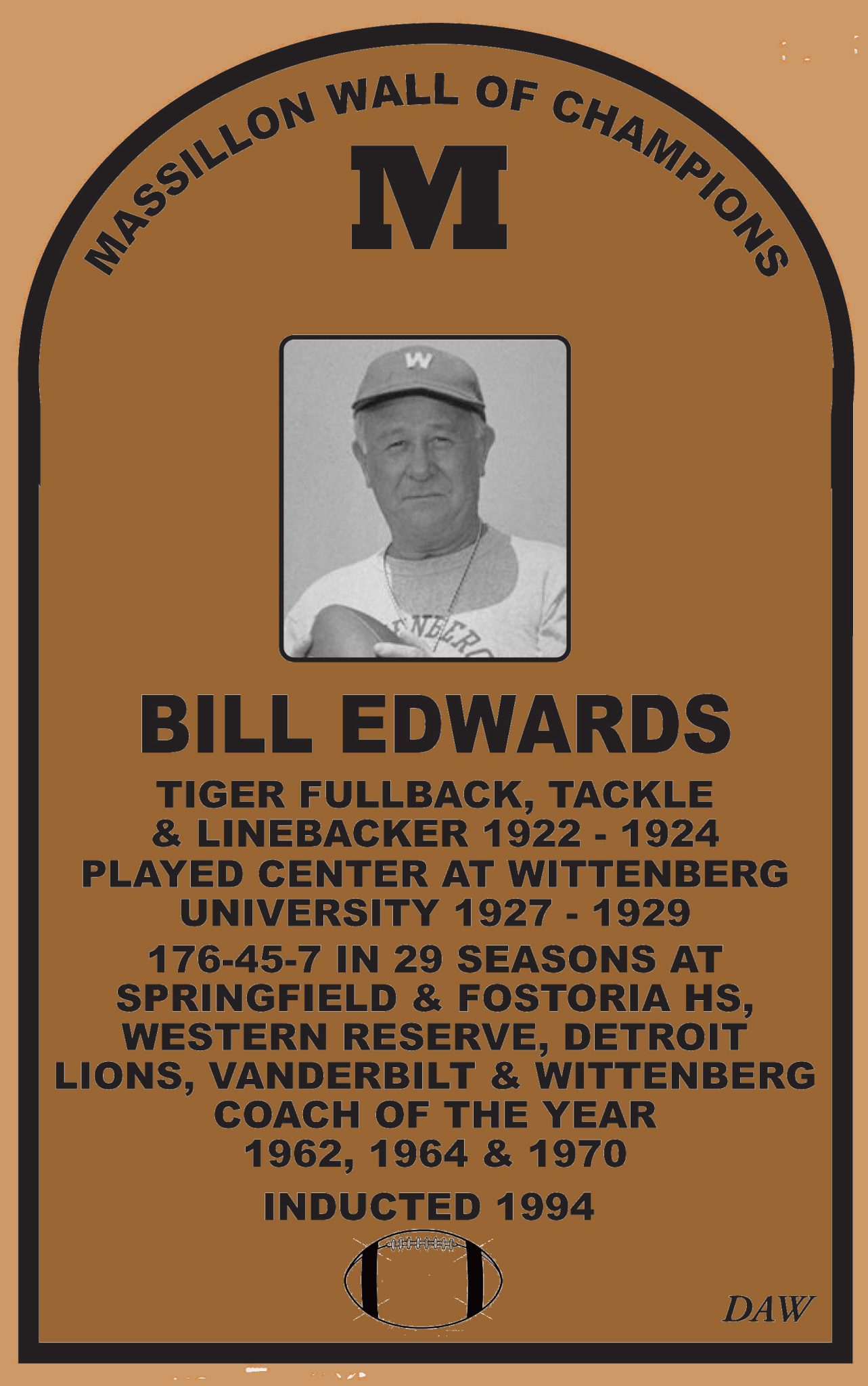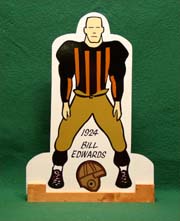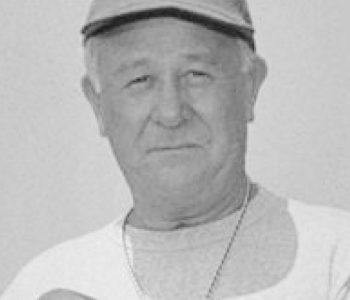 History
History Bill Edwards – Wall of Champions
Bill Edwards – Wall of Champions
From player to coach to sports administrator, William M. “Bill” Edwards spent a lifetime in the sports arena, mostly with football. Along the way he posted some outstanding achievements. And he also rubbed elbows with some of Massillon’s greats. Here is his story.
Edwards was born in Massillon on June 21, 1905. Although he attended school in his formative years, he dropped out following the eighth grade at age 14 to work in the mines in East Greenville in order to help support his family. However, he did play three years of football for the semi-pro Massillon Maroons, which won the Ohio championship in 1921. Then, in 1922 he left the mines and decided to return to school, enrolling in Washington High School as a freshman.
High School
It’s unknown if football is what brought him back to school. It’s also unknown if it was Coach Dave Stewart that drew him back in. It might be that Paul Brown, his classmate, exerted some influence. But it also might have been Tink Ulrich. In any case, he made an immediate impact during his first year and held down a starting linebacker position throughout his time at Massillon. He was big and he was powerful and a thorn in the side for any opposing runner. Edwards was also adept at kicking extra points, punting and kicking off. By his third year he added fullback to the list. A local newspaper reported that as a ball carrier “he was never brought down by a lone defender.” He also hated wearing a football helmet, since it bothered his ears. So, many times he just didn’t.
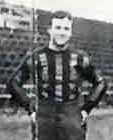 In 1922 the Tigers finished 10-0, outscoring their opponents, 379-28. With popular acclaim in vogue at that time, Massillon declared itself state champion. During the season, Edwards kicked 13 PATs, just missed a drop-kick field goal, and against Warren recovered a fumbled punt snap in the end zone for a touchdown. He was also instrumental in helping his team to a 24-0 victory over Canton McKinley. But his big moment came against Cleveland Shaw when he drop-kicked an extra point with 27 seconds remaining in the game to give his team a 7-6 victory and keep the winning streak alive.
In 1922 the Tigers finished 10-0, outscoring their opponents, 379-28. With popular acclaim in vogue at that time, Massillon declared itself state champion. During the season, Edwards kicked 13 PATs, just missed a drop-kick field goal, and against Warren recovered a fumbled punt snap in the end zone for a touchdown. He was also instrumental in helping his team to a 24-0 victory over Canton McKinley. But his big moment came against Cleveland Shaw when he drop-kicked an extra point with 27 seconds remaining in the game to give his team a 7-6 victory and keep the winning streak alive.
Edwards played left tackle on offense, blocking for stellar running back “Dutch” Hill, but he really excelled at linebacker on defense. “On the line the work of Salberg and Edwards stood out prominently. This pair of tacklers stopped many a Canton drive.” (Massillon Evening Independent).
In his sophomore year Edwards was named team captain, a first at Massillon for an underclassman. Having been shifted to center and lining up alongside Carl “Ducky” Schroeder”, the team fashioned an 8-2 record. Edwards shared kicking duties that year and kicked eight PATs.
In 1924, his junior season, Edwards was again named team captain and played with quarterback Paul Brown. He was also a teammate of running back Elwood Kammer. Both of these players would later coach Massillon. In spite of outscoring their opponents 320-28, the Tigers finished 8-1, with the loss coming to Youngstown South 1-0 via forfeit when Stewart took his team off the field while challenging several referee calls. During the season Edwards kicked 38 PATs and caught a touchdown pass. He was also most likely the leading tackler (defensive records weren’t kept).
With his high school career over and the proud owner of a 26-3 team record and three wins over McKinley, Edwards looked forward to the next level. But he looked back at three outstanding years as a Tiger. In fact, the all-time Massillon High School football team, which was selected in 1958, noted that Edwards was the “Greatest Tiger of them all.”
He also played some basketball at Massillon, again teaming with his friend, Paul Brown.
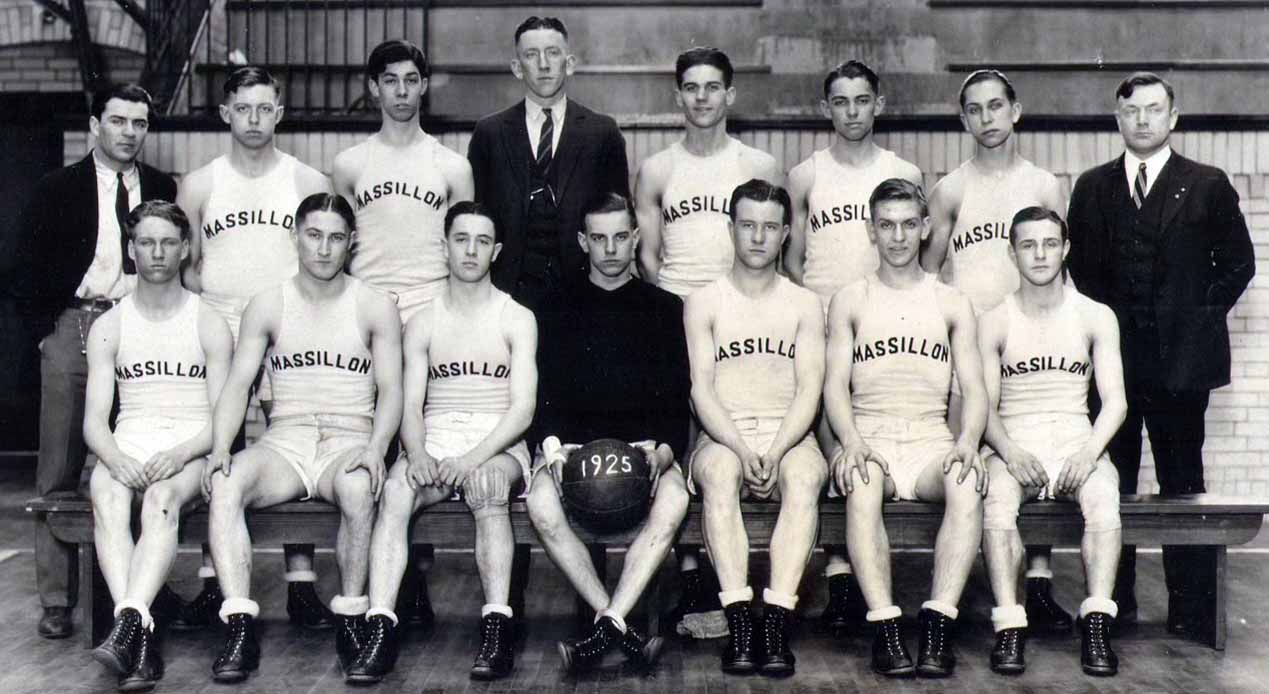
Bill Edwards is pictured in the front row, third from the left. Elwood Kammer is to his right and Paul Brown (black shirt) is to his left. Coach Dave Stewart is in the second row, behind Brown.
By the time his senior year rolled around, Edwards was twenty years old, too old for Ohio high school football. So, he enrolled in Kiski Prep, located in Pennsylvania, as a scholarship player before returning to Massillon for the second half of the school year. There he received his diploma, and prepared for the collegiate level.
College
The first stop as a college player was Ohio State and the freshman team in 1927, where he roomed with Paul Brown. He was also named captain. But he left after the season for Wittenberg, joining six other former Massillon players, including Ducky Schroeder.
In his first year he kicked an extra point as time expired to help his team to a 7-6 victory over Ohio Wesleyan, which had beaten both Michigan and Syracuse. The next two years he was named team captain and excelled at center.
Grantland Rice wrote, “Edwards is the best center in the nation, but I can’t name him All-American because of his team’s schedule.” Walter Eckersall did not overlook Edwards playing at a small college and named him to his All-America team. He was also named to Sam Willaman’s All-American Team.
While at Wittenberg Edwards earned a bachelor’s degree (1931) and then attended a Master’s degree from Columbia University (1956) while coaching.
Coaching
With school behind him, Edwards chose a career path in the coaching world and had a laundry list of stops, including:
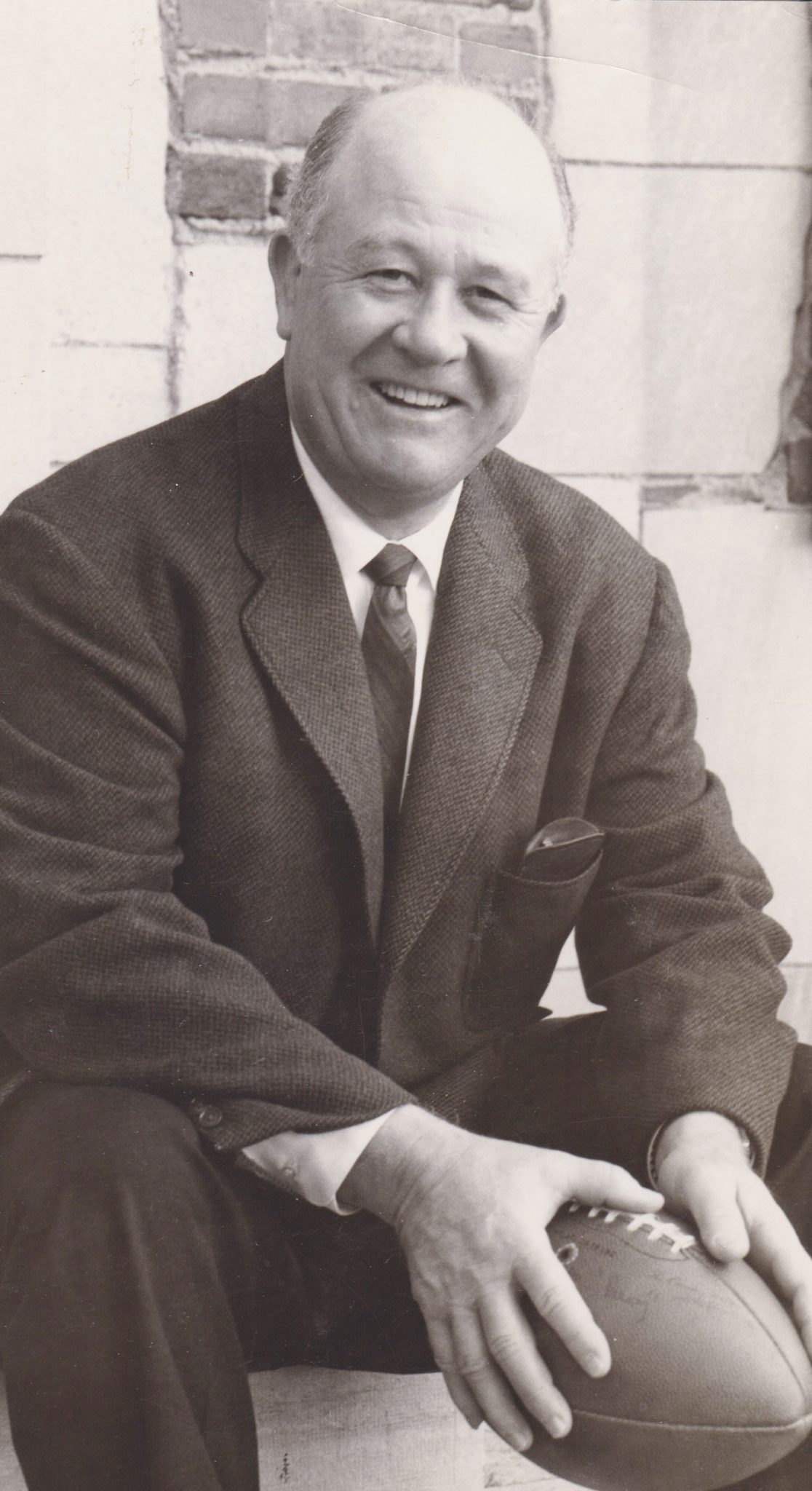 Springfield High School (1931) – Assistant coach and history teacher.
Springfield High School (1931) – Assistant coach and history teacher.- Fostoria High School (1932-33) – Head coach. Produced an 8-2 record in year two, the school’s best mark in ten years. His 1932 coaching offer from Fostoria was better than the offer he received from Massillon, which at the time was replacing Elmer McGrew. With Edwards now out of the picture, the Tigers decided to go with Paul Brown.
- Western Reserve University (1934) – Assistant coach.
- Western Reserve University (1935-40) – Head coach, replacing Sam Willaman, who died suddenly. Compiled a 49-6-2 record. Had three undefeated seasons. Won five Big Four Conference championships (1935-38, 40). Defeated Arizona State 26-13 in the 1941 Sun Bowl. Coached future Cleveland Browns and New England Patriots head coach Bill Belichick.
- Detroit Lions (1941-42) – Head coach. Compiled a record of 4-9-1. Taking over early in the season, moved the team from last place that year to third the next, before enlisting in the Navy prior to season’s end. Bill Belichick was one of his players. Bill would later name his son after Edwards, young Bill’s godfather.
- Saint Mary’s Pre-Flight (1943) – Assistant coach, lieutenant commander, World War II.
- Cleveland Browns (1947-48) – Assistant coach, tackles. Coached under Paul Brown. Cleveland won the AAFC championship both years and was undefeated in 1948. Coached tackle Lou “The Toe” Groza.
- Vanderbilt (1949-52) – Head coach and athletic director. Compiled a record of 21-19-2. Introduced the passing game to the passing game to the Southeast Conference. Was named National Coach of the Week six times.
- North Carolina (1953-54) – Assistant coach.
- Wittenberg (1955-68) – Returned to his alma mater as head coach and athletic director. Replaced the single-wing offense with a pro-style passing attack. Established Wittenberg as an annual contender for the Ohio Athletic Conference title. Compiled a record of 98-20-4. All-time Wittenberg winningest coach. Unbeaten in 1962, 63 and 64. NCAA College Division Poll Champion by the Washington Touchdown Club (1962 and 1964). Won or tied for the Ohio Athletic Conference Championship seven times. Coach of the Year (1963 and 1964). Coached future Oakland Raiders quarterback Charlie Green in 1962-64. The Tigers went 15-0-1 during that span. During his three years, Green passed for 5,575 yards and threw 61 touchdown passes. In 2002, Green was inducted into the College Hall of Fame.
During his career, Edwards received several coaching honors, including:
- Ohio College Football Coach of the Year (1957 and 1962).
- Two times American Football Coaches Associated College Division Coach of the Year (1962–1963).
- National Association of Collegiate Athletic Directors Hall of Fame (1974).
- Case Western Reserve Hall of Fame (1979).
- Ohio High School Football Coaches Association Hall of Fame (1979).
- Wittenberg Athletics Hall of Honor (1985).
- Vanderbilt Hall of Fame (1986).
- College Football Hall of Fame (1986).
- Football Writers Association of America award for contributions to the game.
- Massillon Wall of Champions (1994).
- Massillon Tiger Football Hall of Fame (2019).
- Honorary member of the American Football Coaches Association.
“Wherever I’ve been, from playing for Massillon High School to coaching college squads at Western Reserve, Vanderbilt and Wittenberg, I’ve had some wonderful experiences that I will always remember,” said Edwards.
“If I had it to do over again, I’d still be a football coach,” he said. “You know, I got as much out of coaching the kids as some of them say they got out of playing for me. It’s a little tough sometimes to admit to yourself that one of your players has more humility than you do, or is a little more honest, but it happens. If you teach a boy to compete, he will compete for the rest of his life. Football coaches are educators who teach, among other things, discipline, loyalty, sacrifices for a common good, and cooperation to achieve a worthwhile goal.”
Paul Brown called him, “One of the greatest football players I have ever seen in high school or college. Later he joined me on the Cleveland Browns and did an outstanding job. The players admired, respected, and liked him. He has been my lifelong friend and I cherish my association with him. He has deserved every honor that has come to him.” Other top-level head coaches also had great respect for Edwards.
Edwards left the coaching world after the 1968 season with 38 years on his resume, while leaving his mark at nearly every stop along the way. He was simply a winner and rightly acknowledged throughout his career. His overall head coaching record was 168-45-8, which included a 1-0 record in bowl games. At time of retirement, he had the second-best winning percentage among active coaches with at least 100 wins and owned a commendation from President Richard Nixon for his achievements.
After coaching Edwards remained in Wittenberg as athletic director until 1973. Wittenberg’s football stadium is named Edwards-Maurer Field in honor of both head coaches. Also, the winner of the Wittenberg–Case Western Reserve football game receives the Bill Edwards Trophy.
Not bad for a former coal miner.
Post-Football
Edwards enjoyed hunting and fishing in retirement and spending time with wife Dorothy and their three children. He died in Springfield on June 12, 1987, at the age of 81.
